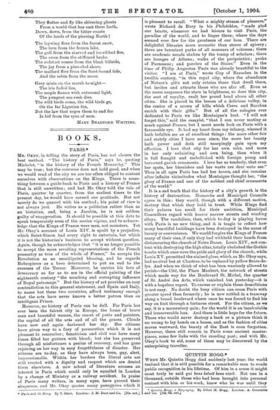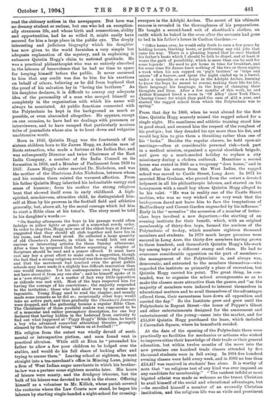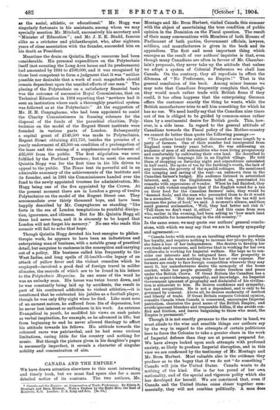WHEN Mr. Quintin Hogg died suddenly last year, the world
realised that it is still possible for a remarkable man to evade public recognition in his lifetime. Of him in a sense it might most truly be said qui bene latuie bens roixit. Not one in a thousand, outside those who had been brought into personal contact with him or his work, knew who he was until they • Quintin Hogg: a Biography. By Ethel M. Hogg. London: A. Constable and Co. [128. 6d. net.]
read the obituary notices in the newspapers. But here was no dreamy student or recluse, but one who led an exception- ally strenuous life, and whose birth and connections, ability and opportunities, had he so willed it, might easily have secured for him a large place in the public eye. The deeply interesting and judicious biography which his daughter
has now given to the world furnishes a very simple but adequate explanation of the mystery, and in explaining it
enhances Quintin Hogg's claim to national gratitude. He was a practical philanthropist who was so entirely absorbed in the labours of benevolence that he had no time to spare for keeping himself before the public. It never occurred to him that any credit was due to him for his exertions on behalf of others, believing as he did from boyhood that the proof of his salvation lay in "loving the brethren." As his daughter declares, it is difficult to convey any adequate idea of the personality of a man who merged himself so completely in the organisation with which his name will always be associated. At public functions connected with the Polytechnic he kept in the background as much as possible, or even absconded altogether. He appears, except on one occasion, to have had no dealings with pressmen or interviewers, and to have escaped that particularly noxious tribe of journalists whose aim is to hunt down and vulgarise unobtrusive worth.
Born in 1845, Quintin Hogg was the fourteenth of the sixteen children born to Sir James Hogg, an Antrim man of Scots extraction, who made a fortune at the Indian Bar, and was subsequently Director and twice Chairman of the East India Company, a member of the India Council on its formation in 1858, and a Member of Parliament from 1839 to 1857. James Hogg's sister married Dr. Nicholson, and was the mother of the illustrious John Nicholson, between whom and his cousins there existed the warmest affection. From his father Quintin Hogg inherited his indomitable energy and sense of humour; from his mother the strong religious bent that showed itself even in early childhood. A high- spirited, mischievous, attractive child, he distinguished him- self at Eton by his prowess in the football field and athletics generally, but, above all, by the moral courage which led him to start a Bible class at his tutor's. The story must be told in his daughter's words :—
"On Sunday afternoons the boys in his passage would often indulge in pillow fights or games of a somewhat rowdy order. In order to stop this, Hogg, now one of the eldest boys at Joynes', suggested that they should all club together and have tea in his room, and then read aloud. He collected a large quantity of old Chambers's Journals, in which he would look out any curious or interesting articles for these Sunday afternoons. After a time he proposed that before separating a chapter of Scripture should be read and a prayer offered. It must have coat any boy a great effort to make such a suggestion, though the fact that a strong religious revival was then moving England, and that the movement had touched even the great public schools may have made it a slightly less difficult innovation than one would imagine. Yet his contemporaries own they would not have stood it from any one else' ; and he himself spoke of it as a sore struggle.' As a matter of fact very little opposition or ridicule was met with. Most of the boys respected him for having the courage of his convictions ; the majority responded to the invitation ; those who held aloof were by no means an- tagonistic. Young Hogg used to read the chapter, and usually made some remarks as he did so ; occasionally other boys would take an active part, and thus gradually the Chambers's Journals were dropped, and the gathering became a regular Bible Class. The Christianity of these youthful zealots was rumoured to be of a muscular and rather peremptory description, for one boy declared that having hidden in the bedstead from curiosity to find out what happened at Piggy Hogg's' Bible Class, he heard a boy who advanced somewhat atheistical theories promptly silenced by the threat of being taken on at football !' " His religion from the outset was wholly devoid of senti- mental or introspective pietism, and soon found vent in practical altruism. While still at Eton he "persuaded his father to allow a few poor children to be lodged over the
stables, and would do his full share of looking after and trying to amuse them." Leaving school at eighteen, he went straight into a, tea-merchant's office in Mincing Lane, joining a firm of West Indian sugar merchants in which his brother- in-law was a partner some eighteen months later. His hours of leisure were scanty, and the drudgery irksome, but the bulk of his leisure was devoted to work in the slums. Offering himself as a volunteer to Mr. Killick, whose parish covered the rookeries where the Law Courts now stand, he began his labours by starting single-handed a night-school for crossing- sweepers in the Adelphi Arches. The secret of his ultimate success is revealed in the thoroughness of his preparations. He bought a second-hand suit of ahoeblack's clothes, an outfit which he baked in the oven after the servants had gone to bed in his father's house in Carlton Gardens :—
" Office hours over, he would sally forth to earn a few pence by bolding horses, blacking boots, or performing any odd jobs that came his way. There is a pleasing legend that he once blacked his father's boots which I should be loth to dispel, and at least it wears the garb of possibility, which is more than can be said for some legends ! He used to get home in time for breakfast, and for some time Sir James knew nothing of the two or three nights a week when his son supped on pig's trotters' or tripe and onions' off a barrow, and spent the night curled up in a barrel, under a tarpaulin or on a ledge in tho Adelphi Arches, learning to know the boys he meant to rescue, making their life his life, their language his language, in the hope of changing their thoughts and lives. After a few months of this work, he and Arthur Kinnaird hired a room in Of Alley' (now York Place, Charing Cross) for which they paid the sum of £12 a year, and started the ragged school from which the Polytechnio was to spring."
From that day to 1868, when be went abroad for the first time, Quintin Hogg scarcely missed the ragged school for a single night. His manliness and athletic training stood him in good stead, and secured him the respect of the roughest of his proteges; but they dreaded his eye more than his fist, and would beg him to give them a thrashing rather than one of his "looks." Besides the regular classes, he held open-air meetings—often at considerable personal risk—took part in a medical mission, organised a special shoeblack brigade, and gave up a much-needed holiday to replace a city missionary during a cholera outbreak. Meantime a second house was rented in 1865 as a twopenny "doss house," and in 1868, after his return from the West Indies, the ragged school was moved to Castle Street, Long Acre. In 1871 be married Miss Graham, who proved from the outset a devoted helpmeet in all his philanthropic labours, and started on his honeymoon with a small boy whom Quintin Hogg alleged to be his valet. "He was in reality one of the Castle Street urchins, who was so very wicked or so very weak that the bridegroom dared not leave him to face the temptations of Bedfordbury and Covent Garden unguarded by his influence." Early in the " seventies " the accession of a number of better. class boys involved a new departure,—the starting of an evening institute for their benefit, - which, with an original membership of thirty-five boys, formed the nucleus of the Polytechnic of to-day, which numbers eighteen thousand members and students. In 1878 much larger premises were secured in Long Acre, the thirty-five members having grown to three hundred; and thenceforth Quintin Hogg's life-work lay among boys of a different stamp and class. He had to overcome considerable opposition on the part of members— the management of the Polytechnic is, and always was, democratic, and entrusted to the members themselves—who regarded the institute as primarily a place of recreation, but Quintin Hogg carried his point. The great thing, he con- tended, was to organise the school arrangements so as to make the classes more attractive than the games, and "as the majority of members were induced to interest themselves in educational matters and to avail themselves of the advantages offered them, their earnestness bore down all opposition and carried the day." So the Institute grew and grew until the Polytechnic in Regent Street—the home of Pepper's Ghost and other entertainments designed for the amusement and entertainment of the young—came into the market, and for £15,000 Quintin Hogg purchased the lease, which included 5 Cavendish Square, where he henceforth resided.
At the date of the opening of the Polytechnic there were practically no facilities for mechanics or artisans who wished to improve either their knowledge of their trade or their general education, but within twelve months of the move into the new premises one hundred trade classes attended by five thousand students were in full swing. In 1894 five hundred evening classes were held every week, and in 1903 no less than 214,417 was received in students' fees alone. It is worthy of note that "no religious test of any kind was ever imposed on any candidate for membership." "The rankest infidel or most bigoted atheist was made as welcome as the truest Christian to avail himself of the social and educational advantages, but —he enrolled himself a member of an avowedly Christian institution, and the religious life was as virile and prominent
as the social, athletic, or educational." Mr. Hogg was singularly fortunate in his assistants, among whom we may specially mention Mr. Mitchell, successively his secretary and "Minister of Education" ; and Mr. J. E. K. Studd, famous alike as a cricketer and philanthropist, who, after eighteen years of close association with the founder, succeeded him on his death as President.
Meantime the drain on Quintin Hogg's resources had been considerable. His personal expenditure on the Polytechnic itself (not counting the Long Acre house and its predecessors) had amounted by 1884 to 2100,000, and it was recognised by those best competent to form a judgment that it was "neither possible nor desirable that a work of such magnitude should remain dependent upon the unaided efforts of one man." The placing of the Polytechnic on a satisfactory financial basis was the outcome of successive Royal Commissions, that on Technical Education in 1884 reporting that "nowhere had it seen an institution where such a thoroughly practical system was followed as at the Polytechnic." At the suggestion of Mr. H. H. Cunynghame, who had been appointed to assist the Charity Commissioners in framing schemes for the disposal of the funds of the parochial charities, Poly- technics on the model of the Regent Street institute were founded in various parts of London. Subsequently a capital grant of 2149,500 was made to Polytechnics, Regent Street obtaining £11,750, besides the promise of a yearly endowment of 23,500 on condition of a prolongation of the lease and the raising of a supplementary endowment of 235,000 from the public. The first stipulation was soon fulfilled by the Portland Trustees ; but to meet the second Quintin Hogg was for the first time in his life driven to appeal to the public. The Times lent its powerful aid in an admirable summary of the achievements of the institute and its founder, and in 1891 the Commissioners handed over the fund to the newly appointed trustees for administration. Mr. Hogg being one of the five appointed by the Crown. At the present moment there are in London a group of twelve Polytechnics on the model of the Regent Street one. They accommodate over thirty thousand boys, and have been happily described by Mr. Cunynghame as standing "like forts in the sea of London temptations to youthful dissipa- tion, ignorance, and idleness. But for Mr. Quintin Hogg all these had never been, and it is sincerely to be hoped that London will not forget his memory." No one who reads this memoir will fail to echo that hope.
Though Quintin Hogg devoted his best energies to philan- thropic work, be appears to have been an industrious and enterprising man of business, with a notable grasp of practical detail, but sanguine to rashness in the conception and carrying out of a policy, His business called him frequently to the West Indies, and long spells of ill-health—the legacy of an attack of yellow fever and the violent remedies which he employed—involved a good deal of foreign travel in milder climates, the records of which are to be found in his letters to the Polytechnic Magazine. In one sense of the word he was an unlucky man. His house was twice burnt down, and be was constantly being laid up by accidents, the result in part of his continued addiction to violent athletics,—it is mentioned that he celebrated his jubilee as a football player, though he was only fifty-eight when he died. Like most men of an earnest nature, he suffered from fits of depression, but he never lost interest or enthusiasm in his work. An extreme Evangelical in youth, he modified his views on such points as verbal inspiration, for example, as he advanced in life; but from beginning to end he never allowed theology to affect his attitude towards his fellows. His attitude towards the coloured races was patriarchal, and he had some curious limitations, caring little for the country and nothing for music. But though the picture given in his daughter's pages is necessarily imperfect, it reveals a character of singular nobility and concentration of aim.
























































 Previous page
Previous page